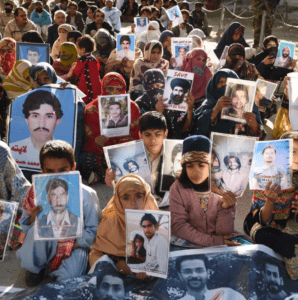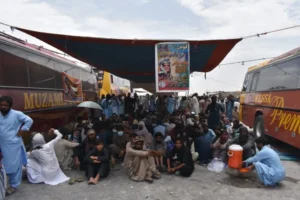The Baloch people in Pakistan have long faced a grim reality of enforced disappearances and extrajudicial killings, issues that have plagued the region for decades. Despite international condemnation and domestic outcry, these violations continue with alarming regularity. The recent protests in Gwadar have brought renewed attention to the plight of the Baloch people and the systemic abuses they endure.
Historical Context
Enforced disappearances in Balochistan have a long and tragic history, rooted in the region’s complex political dynamics. Since the 1970s, Balochistan has experienced significant unrest, driven by a struggle for greater autonomy and resource control. The Pakistani state has often responded to Baloch nationalist movements with military force and coercive measures, including enforced disappearances.
The situation worsened in the early 2000s when a renewed insurgency led to an intensified crackdown. This period saw a marked increase in the use of enforced disappearances as a counterinsurgency tactic. The state’s security forces, often operating with impunity, targeted suspected militants, activists, and even civilians. Human rights organizations have documented numerous cases where individuals were abducted, detained in secret facilities, and subjected to torture. Many of these individuals never returned, leaving their families in a state of perpetual uncertainty.
The Voice for Baloch Missing Persons (VBMP) has been a vocal advocate for the victims of these disappearances. However, the Commission of Inquiry on Enforced Disappearances has been criticized for its ineffectiveness. According to Nasrullah Baloch, chairman of VBMP, the Commission often dismisses cases or fails to recognize them as enforced disappearances, even when evidence is compelling. This lack of official acknowledgment and accountability perpetuates a culture of impunity, allowing the practice to continue unchecked.

The Role of Women in the Baloch Protests: Personal Stories
Women have emerged as a central force in the protests against enforced disappearances in Balochistan, representing the emotional and societal toll of this crisis. Many of these women are mothers, sisters, and daughters of the disappeared, often referred to as “half-widows” due to the uncertainty of their loved ones’ fates.
The stories of the disappeared are heartbreaking and varied, but they share common threads of loss, uncertainty, and injustice. Sammi Deen Baloch, who has been searching for her father, Dr. Deen Muhammad Baloch, since his disappearance in 2009, symbolizes the relentless struggle of Baloch families.
“We are not asking for big projects or schemes in Balochistan; all we are asking for is the fate of our loved ones,” she pleads.
Figures like Sammi Deen Baloch have since become symbols of resilience and defiance.
In another tragic case, five-year-old Meroz has grown up without her father, Abdul Hameed Zehri, who disappeared on April 10, 2021. Her older sister, Saeeda Baloch, continues to seek answers, describing the anguish of their family:
“When you kidnap one person, you end up destroying their whole family. We don’t even know yet if we’ve been orphaned or not.”
Ruksana Baloch, who was just 11 years old when her brother Azeem Dost was taken, shares a similar story of unresolved loss. Now 20, she recounts how she has attended rallies, filed reports, and sought legal recourse, all to no avail.
These women not only challenge the state’s oppressive actions but also confront cultural norms by stepping into public and activist roles traditionally reserved for men. The emotional impact on these women is profound; their stories embody the agony and perseverance of countless others. These women endure psychological trauma, social ostracization, and economic hardships that come with going against the State. The protests they lead and participate in, such as the Baloch Long March in December of last year, where women journeyed about a thousand miles from Balochistan to the capital city, Islamabad, aim to bring international attention to their cause. Despite facing severe backlash and abuses, these women continue to fight for justice, driven by hope and the desire for closure.
The Response of the State
The Pakistani government’s response to the Baloch protests has been characterized by repression and attempts to stifle dissent. Authorities have frequently employed heavy-handed tactics, including police violence, mass arrests, and the imposition of bans on public gatherings under Section 144. These measures are aimed at quelling demonstrations and suppressing the voices of Baloch activists who demand justice for enforced disappearances and human rights abuses.
Government officials have often dismissed the protesters’ claims, suggesting that reports of human rights violations are exaggerated. They have also sought to delegitimize the protests by labeling participants as foreign agents or security threats, further marginalizing the Baloch community. This attitude reflects a broader culture of impunity within the state apparatus, where the state forces operate with little oversight and their priority appears to be maintaining order rather than addressing the underlying grievances of the Baloch people.
A Call for Justice and Accountability

The ongoing protests in Gwadar and other parts of Balochistan highlight a deep-seated demand for justice and accountability among the Baloch people. The recent “Baloch Raji Machi” protests have been marked by a severe response from the Pakistani authorities as usual, including the deaths of at least three protestors and numerous arrests, including prominent activists like Sammi Deen Baloch. These protests, organized by the Baloch Yakjehti Committee (BYC), call for an end to enforced disappearances, extrajudicial killings, and the restoration of civil, political, and economic rights.
The crackdowns on the protests has been condemned by Amnesty International, which asserts that such actions violate Pakistan’s obligations under both its constitution and international human rights law. The Human Rights Commission of Pakistan (HRCP) have called for independent investigations and greater transparency, stressing that the ongoing abuses not only violate human rights but also fuel instability in the region.The international community and Pakistani civil society must continue to exert pressure on the government to halt these abuses, ensure the release of detained activists, and foster a resolution that upholds the rights and dignity of the Baloch people.
The history of enforced disappearances in Balochistan is not just a tale of political repression but also a reflection of the broader struggle between the Baloch people’s demands for rights and the state’s efforts to maintain control. Despite international and domestic pressure, the issue remains unresolved, with families of the disappeared still awaiting justice.
Click Baloch Yakjheti Committee X for more updates
Related Stories:
What is the reason behind Balochistan protests in Gwadar?
The U.S. Embassy funds an awareness campaign on gender based violence in Balochistan
















